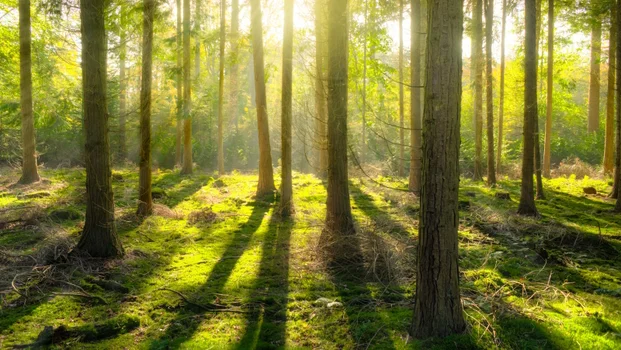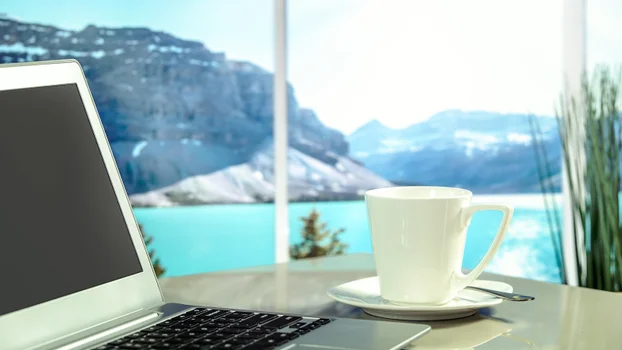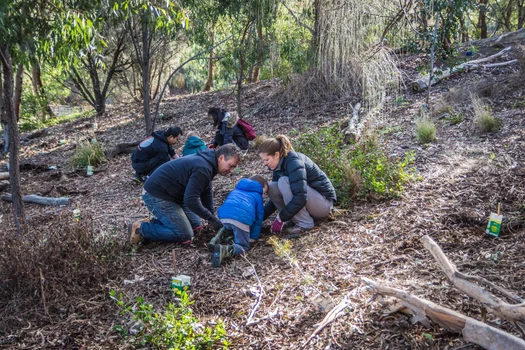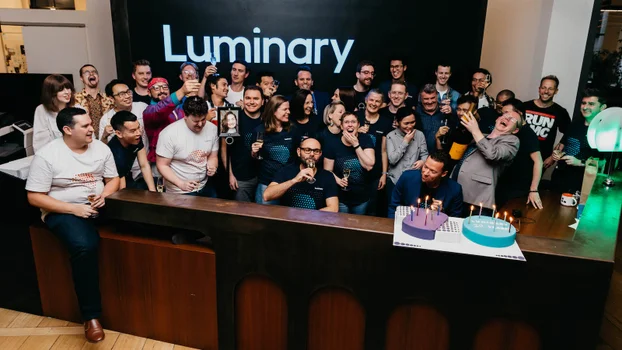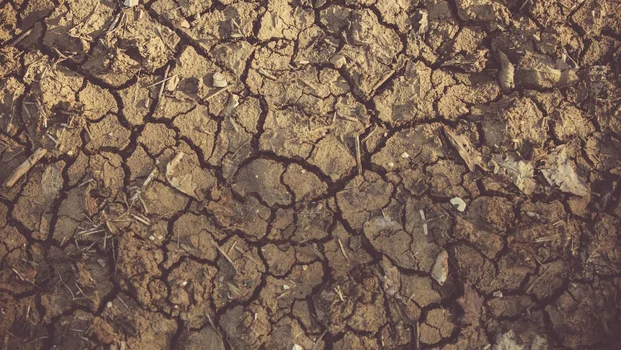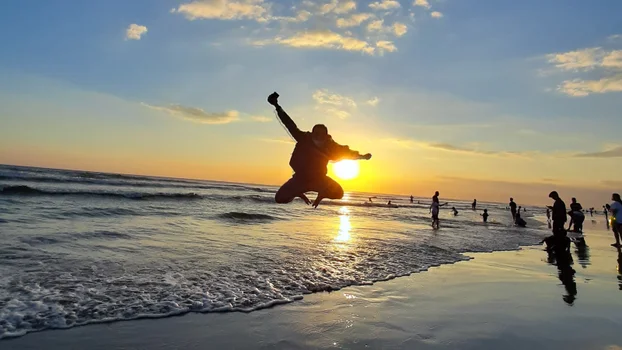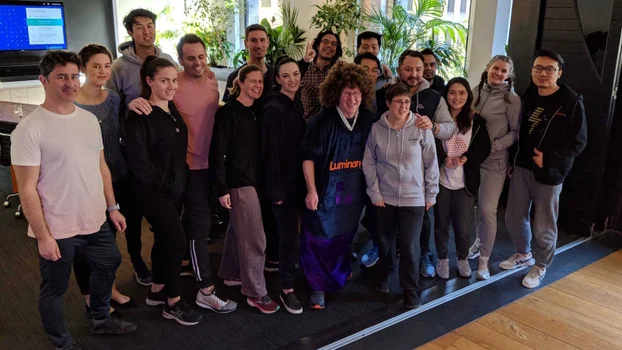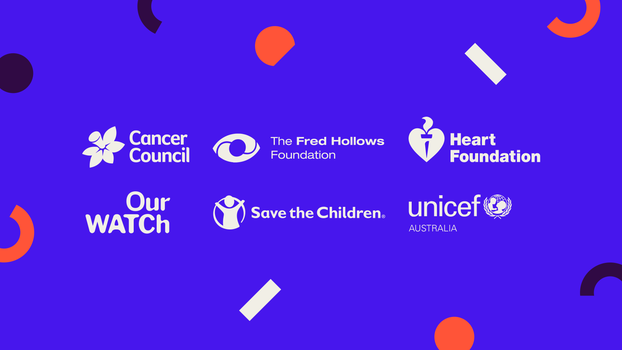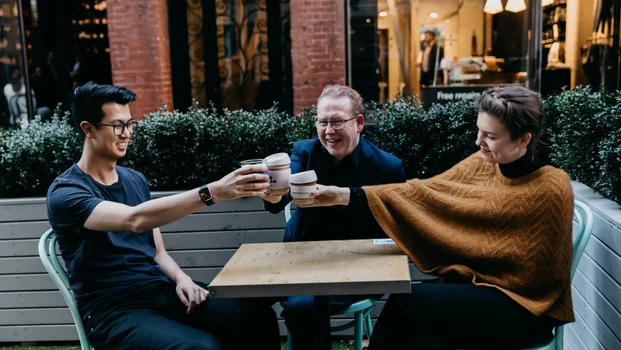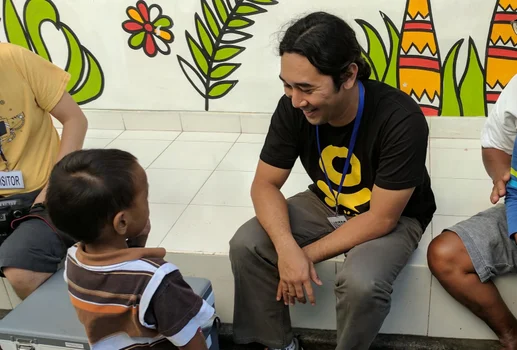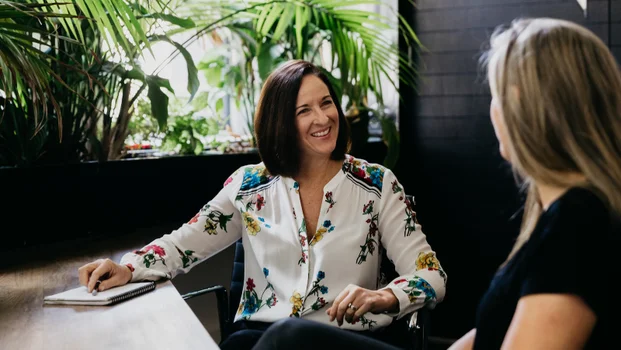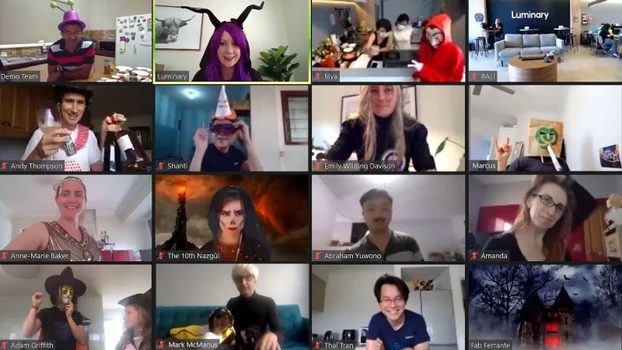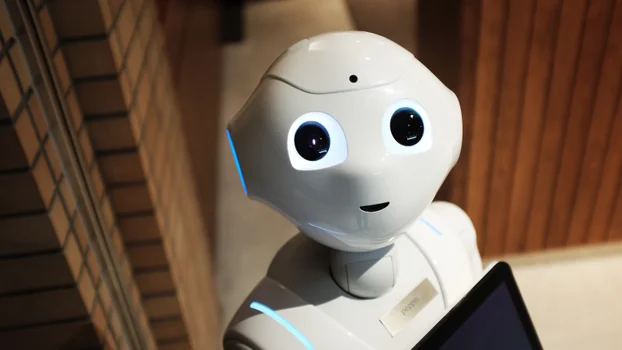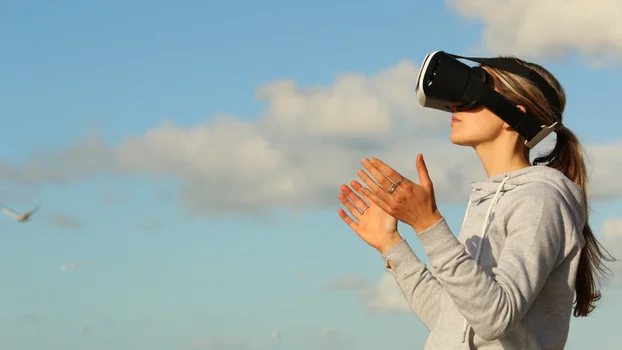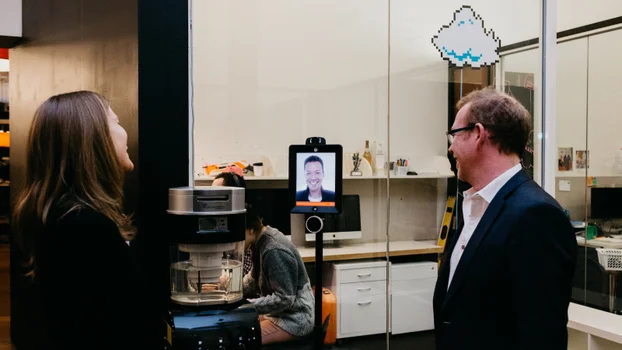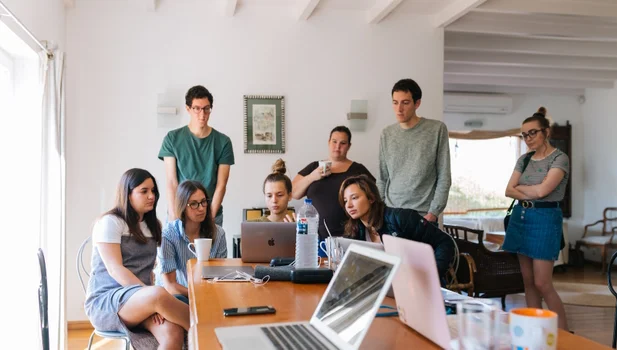Keep Reading
Want more? Here are some other blog posts you might be interested in.
[{"itemId":"9b798cd2-04c5-475c-9349-7725d5e0ead3","title":"Nathan Batham: Reimagining medtech","introduction":"In the second of our series on the finalists of the Luminary Tech Visionary category of the Victorian Young Achiever Awards, we profile Nathan Batham – founder of medtech product development studio Product Design Lab.","blogUrl":"/blog/nathan-batham-reimagining-medtech","isFeatured":false,"authors":{"publishDate":"09 April 2025","readingTime":7,"authors":[{"authorName":"Tami Iseli","authorUrl":"/tami"}],"authorImageUrl":"https://assets-us-01.kc-usercontent.com:443/90e79cae-25c6-00b5-6f5b-27efe5c250ab/5f1c7c01-0c57-4e76-9487-3b24a04b95ca/Tami_thumb.jpg?w=90&h=90&fm=webp","authorAlt":"Tami Iseli"},"readingTime":7,"tags":[],"img":{"src":"https://assets-us-01.kc-usercontent.com:443/90e79cae-25c6-00b5-6f5b-27efe5c250ab/c5adafde-1d8c-4461-9286-b0cd96b0a396/Screenshot%202024-09-25%20at%208.19.47%E2%80%AFam.png?h=350&fm=webp","alt":"Nathan Batham at work","width":1600,"height":900},"lastModified":"2025-04-10T02:20:46.9327892Z","codeNameHeroImage":"hero_image","codeNameTitle":"title"},{"itemId":"b52563d1-368a-4018-9ba0-4bcb2dadea62","title":"Anthony Kwok: Transforming online shopping","introduction":"In the first of our series on the finalists of the Luminary Tech Visionary category of the Victorian Young Achiever Awards, we profile Anthony Kwok – co-founder of ZILIO, an innovative online fitting technology.","blogUrl":"/anthony-kwok-transforming-online-shopping","isFeatured":false,"authors":{"publishDate":"09 April 2025","readingTime":4,"authors":[{"authorName":"Clarice Greening","authorUrl":"/clarice-greening"}],"authorImageUrl":"https://assets-us-01.kc-usercontent.com:443/90e79cae-25c6-00b5-6f5b-27efe5c250ab/51f2c583-e730-4e65-9782-df419e11a65d/Clarice%20headshot%20square%20%20close.png?w=90&h=90&fm=webp","authorAlt":"Clarice Greening"},"readingTime":4,"tags":[],"img":{"src":"https://assets-us-01.kc-usercontent.com:443/90e79cae-25c6-00b5-6f5b-27efe5c250ab/a0a96a94-01d2-49ad-b3fc-4d67294172af/DIF%202023%20Tech%20Trends%20Debate%20%282%20of%203%29%20%281%29.jpg?h=350&fm=webp","alt":"Anthony Kwok at Digital Innovation festival","width":1600,"height":900},"lastModified":"2025-04-10T23:38:11.5955184Z","codeNameHeroImage":"hero_image","codeNameTitle":"title"},{"itemId":"a778ff96-d42d-40f0-82df-70544c5c51b5","title":"AI: Friend or foe in a purpose-driven world? ","introduction":"As part of this year’s B Corp Month, Luminary hosted a panel event exploring the question of whether AI is a friend or foe to purpose-driven organisations. Here, we summarise the insights that came from the discussion.","blogUrl":"/blog/ai-friend-or-foe-in-a-purpose-driven-world","isFeatured":false,"authors":{"publishDate":"07 April 2025","readingTime":6,"authors":[{"authorName":"Tami Iseli","authorUrl":"/tami"}],"authorImageUrl":"https://assets-us-01.kc-usercontent.com:443/90e79cae-25c6-00b5-6f5b-27efe5c250ab/5f1c7c01-0c57-4e76-9487-3b24a04b95ca/Tami_thumb.jpg?w=90&h=90&fm=webp","authorAlt":"Tami Iseli"},"readingTime":6,"tags":[],"img":{"src":"https://assets-us-01.kc-usercontent.com:443/90e79cae-25c6-00b5-6f5b-27efe5c250ab/af187b8b-0b72-4ff2-8817-211e86573213/PXL_20250320_071742366.MP.jpg?h=350&fm=webp","alt":"View of the panel event from the back of the room","width":1600,"height":900},"lastModified":"2025-04-08T19:57:59.8421404Z","codeNameHeroImage":"hero_image","codeNameTitle":"title"},{"itemId":"ec48f150-9a20-4fae-ab10-e8a92dafd508","title":"Luminary retains Umbraco Contributing Partner status ","introduction":"We are proud to announce that we have again been awarded the Umbraco Contributing Partner badge for our contributions to Umbraco in 2024.\n","blogUrl":"/blog/luminary-retains-umbraco-contributing-partner-status","isFeatured":false,"authors":{"publishDate":"20 March 2025","readingTime":2,"authors":[{"authorName":"Tami Iseli","authorUrl":"/tami"}],"authorImageUrl":"https://assets-us-01.kc-usercontent.com:443/90e79cae-25c6-00b5-6f5b-27efe5c250ab/5f1c7c01-0c57-4e76-9487-3b24a04b95ca/Tami_thumb.jpg?w=90&h=90&fm=webp","authorAlt":"Tami Iseli"},"readingTime":2,"tags":[{"name":"Development","codename":"development"},{"name":"Umbraco","codename":"umbraco"}],"img":{"src":"https://assets-us-01.kc-usercontent.com:443/90e79cae-25c6-00b5-6f5b-27efe5c250ab/03983ccf-8e7b-471c-a179-7804678040ce/Mario%20and%20Emm%20MVPs.jpg?h=350&fm=webp","alt":"Emmanuel Tissera and Mario Lopez - Umbraco MVPs","width":1600,"height":896},"lastModified":"2025-03-21T00:25:10.8483114Z","codeNameHeroImage":"hero_image","codeNameTitle":"title"},{"itemId":"5a1dd474-71eb-4795-8e66-9b24ff1e1071","title":"A practical guide to writing AI-friendly content","introduction":"Learn some practical SEO and content tips for structuring and optimising your content so it’s more likely to be referenced in AI-generated summaries and overviews.","blogUrl":"/blog/practical-guide-to-writing-ai-friendly-content","isFeatured":false,"authors":{"publishDate":"17 March 2025","readingTime":6,"authors":[{"authorName":"Shayna Burns","authorUrl":"/shayna"}],"authorImageUrl":"https://assets-us-01.kc-usercontent.com:443/90e79cae-25c6-00b5-6f5b-27efe5c250ab/83a416d3-1fe5-4780-9c56-455dd7348b4f/Shayna_thumb.jpg?w=90&h=90&fm=webp","authorAlt":"Shayna Burns"},"readingTime":6,"tags":[{"name":"Strategy","codename":"strategy"},{"name":"Artificial Intelligence","codename":"artificial_intelligence"}],"img":{"src":"https://assets-us-01.kc-usercontent.com:443/90e79cae-25c6-00b5-6f5b-27efe5c250ab/11d2435d-55c4-4347-8538-e424a2288538/pexels-andrew-2682452.jpg?h=350&fm=webp","alt":"Woman typing on laptop","width":1600,"height":900},"lastModified":"2025-03-18T02:35:26.0008671Z","codeNameHeroImage":"hero_image","codeNameTitle":"title"},{"itemId":"c1ee1a3f-9810-41df-a654-bb3a1a87b5eb","title":"Luminary named as a Beyond Blue Supporting Partner","introduction":"We are thrilled to announce that we have officially been named by Beyond Blue as one of its Supporting Partners, joining some of Australia’s top businesses.","blogUrl":"/blog/luminary-named-as-a-beyond-blue-supporting-partner","isFeatured":false,"authors":{"publishDate":"13 March 2025","readingTime":3,"authors":[{"authorName":"Clarice Greening","authorUrl":"/clarice-greening"},{"authorName":"Tami Iseli","authorUrl":"/tami"}],"authorImageUrl":"https://assets-us-01.kc-usercontent.com:443/90e79cae-25c6-00b5-6f5b-27efe5c250ab/51f2c583-e730-4e65-9782-df419e11a65d/Clarice%20headshot%20square%20%20close.png?w=90&h=90&fm=webp","authorAlt":"Clarice Greening"},"readingTime":3,"tags":[{"name":"Culture","codename":"culture"}],"img":{"src":"https://assets-us-01.kc-usercontent.com:443/90e79cae-25c6-00b5-6f5b-27efe5c250ab/d4dfa3ff-26af-44fa-ae5d-b6451923b696/Luminary%20team%20with%20Marty%20Drill%20and%20Georgie%20Harman%20blog%20hero.jpeg?h=350&fm=webp","alt":"Marty with Georgie Harman and Luminary team in Melbourne office","width":1600,"height":903},"lastModified":"2025-03-17T01:38:23.4511288Z","codeNameHeroImage":"hero_image","codeNameTitle":"title"},{"itemId":"71254e8e-a2c8-457c-928b-1eb660aa45b6","title":"How AI is revolutionising the CMS landscape","introduction":"Luminary MD Adam Griffith reviews how some of the leading Content Management Systems are incorporating AI into their offerings.","blogUrl":"/blog/how-ai-is-revolutionising-the-cms-landscape","isFeatured":false,"authors":{"publishDate":"03 March 2025","readingTime":14,"authors":[{"authorName":"Adam Griffith","authorUrl":"/adam"}],"authorImageUrl":"https://assets-us-01.kc-usercontent.com:443/90e79cae-25c6-00b5-6f5b-27efe5c250ab/83a52d8d-13c7-4380-8f15-7f24726983a6/Adam_thumb.jpg?w=90&h=90&fm=webp","authorAlt":"Adam Griffith"},"readingTime":14,"tags":[{"name":"Kentico","codename":"kentico"},{"name":"Headless CMS","codename":"headless_cms"},{"name":"Kentico Kontent","codename":"kentico_kontent"},{"name":"Xperience","codename":"xperience"},{"name":"Optimizely","codename":"optimizely"},{"name":"Sitecore","codename":"sitecore"},{"name":"Composable DXP","codename":"composable_dxp"},{"name":"Artificial Intelligence","codename":"artificial_intelligence"}],"img":{"src":"https://assets-us-01.kc-usercontent.com:443/90e79cae-25c6-00b5-6f5b-27efe5c250ab/2f45b855-d13b-4a0f-9e14-88227189d3e9/AI%20CMS%20hero.png?h=350&fm=webp","alt":"AI and CMS image generated by Canva","width":1600,"height":900},"lastModified":"2025-03-12T03:36:13.1980585Z","codeNameHeroImage":"hero_image","codeNameTitle":"title"},{"itemId":"dd669656-0003-4be5-a81b-9f5ee657231a","title":"Is Xperience by Kentico ready?","introduction":"Xperience by Kentico, Kentico's next-generation flagship DXP, is still relatively new on the scene, with monthly releases and a rapidly evolving roadmap. This regularly-updated post attempts to cut through the noise and help you determine whether you and the product are ready for each other yet.","blogUrl":"/blog/is-xperience-by-kentico-ready","isFeatured":false,"authors":{"publishDate":"06 February 2025","readingTime":6,"authors":[{"authorName":"Andy Thompson","authorUrl":"/andy"}],"authorImageUrl":"https://assets-us-01.kc-usercontent.com:443/90e79cae-25c6-00b5-6f5b-27efe5c250ab/ad43a4aa-bf08-4120-9b61-052f2af0c804/Andy_thumb.jpg?w=90&h=90&fm=webp","authorAlt":"Andy Thompson"},"readingTime":6,"tags":[{"name":"Kentico","codename":"kentico"},{"name":"Xperience","codename":"xperience"}],"img":{"src":"https://assets-us-01.kc-usercontent.com:443/90e79cae-25c6-00b5-6f5b-27efe5c250ab/b049ebdd-ea6e-4f81-8f3c-8c4beb01ba63/dxp-crossroads.png?h=350&fm=webp","alt":"An illustration of a signpost in a wilderness, with signs pointing to common DXP features","width":1312,"height":736},"lastModified":"2025-02-06T00:08:16.5812233Z","codeNameHeroImage":"hero_image","codeNameTitle":"title"},{"itemId":"87b2159d-688f-4cec-8222-efa79ffa910a","title":"Six ways generative AI is reshaping our search experience","introduction":"Adoption of AI-powered search is picking up steam, and it’s changing where and how users are searching. Marketers have an opportunity to take a fresh look at their content, web development and measurement priorities to better align with generative AI’s unique criteria using generative engine optimisation (GEO) tactics.","blogUrl":"/blog/six-ways-generative-AI-is-reshaping-our-search-experience","isFeatured":false,"authors":{"publishDate":"03 February 2025","readingTime":7,"authors":[{"authorName":"Shayna Burns","authorUrl":"/shayna"}],"authorImageUrl":"https://assets-us-01.kc-usercontent.com:443/90e79cae-25c6-00b5-6f5b-27efe5c250ab/83a416d3-1fe5-4780-9c56-455dd7348b4f/Shayna_thumb.jpg?w=90&h=90&fm=webp","authorAlt":"Shayna Burns"},"readingTime":7,"tags":[{"name":"Artificial Intelligence","codename":"artificial_intelligence"}],"img":{"src":"https://assets-us-01.kc-usercontent.com:443/90e79cae-25c6-00b5-6f5b-27efe5c250ab/f87ac3a0-9c12-4a99-b365-6540f7a5257b/andy-kelly-0E_vhMVqL9g-unsplash.jpg?h=350&fm=webp","alt":"Robot and girl","width":1600,"height":900},"lastModified":"2025-03-12T03:40:23.0549276Z","codeNameHeroImage":"hero_image","codeNameTitle":"title"},{"itemId":"805eff57-f7e0-46f5-9b17-f67187db46cd","title":"Shaping future generations of developers through the Umbraco Education Program","introduction":"Our very own Technical Director, Emmanuel Tissera, and Digital Producer Adi Selva, flew over 8000km to teach students where he grew up in Colombo, Sri Lanka, the power of using Umbraco for software development to inspire their future careers.","blogUrl":"/blog/shaping-future-generations-of-developers-through-the-umbraco-education-program","isFeatured":false,"authors":{"publishDate":"19 January 2025","readingTime":3,"authors":[{"authorName":"Clarice Greening","authorUrl":"/clarice-greening"}],"authorImageUrl":"https://assets-us-01.kc-usercontent.com:443/90e79cae-25c6-00b5-6f5b-27efe5c250ab/51f2c583-e730-4e65-9782-df419e11a65d/Clarice%20headshot%20square%20%20close.png?w=90&h=90&fm=webp","authorAlt":"Clarice Greening"},"readingTime":3,"tags":[{"name":"Culture","codename":"culture"},{"name":"Development","codename":"development"},{"name":"Umbraco","codename":"umbraco"}],"img":{"src":"https://assets-us-01.kc-usercontent.com:443/90e79cae-25c6-00b5-6f5b-27efe5c250ab/72aa75cb-4bb1-42d0-bf02-0d9a2d02d8ac/11151728-6f01-472e-8d78-07d2d07f8935.jpg?h=350&fm=webp","alt":"Girls infront of computer","width":1440,"height":810},"lastModified":"2025-01-21T23:43:21.5525557Z","codeNameHeroImage":"hero_image","codeNameTitle":"title"},{"itemId":"98e4be5f-7ad8-4a13-8ea5-b6cf7d8e9fe5","title":"Digital trend predictions for 2025","introduction":"In our annual meeting of the minds, our industry experts dissect every angle of digital and predict what technologies and trends will shape the year ahead.","blogUrl":"/blog/digital-trend-predictions-for-2025","isFeatured":false,"authors":{"publishDate":"12 December 2024","readingTime":8,"authors":[{"authorName":"Clarice Greening","authorUrl":"/clarice-greening"}],"authorImageUrl":"https://assets-us-01.kc-usercontent.com:443/90e79cae-25c6-00b5-6f5b-27efe5c250ab/51f2c583-e730-4e65-9782-df419e11a65d/Clarice%20headshot%20square%20%20close.png?w=90&h=90&fm=webp","authorAlt":"Clarice Greening"},"readingTime":8,"tags":[{"name":"Strategy","codename":"strategy"}],"img":{"src":"https://assets-us-01.kc-usercontent.com:443/90e79cae-25c6-00b5-6f5b-27efe5c250ab/dcbf5843-fc30-41db-a345-a53d88fc027e/Screenshot%202024-12-04%20at%203.33.37%E2%80%AFPM%20%281%29.png?h=350&fm=webp","alt":"two people on purple background with VR headsets on","width":1600,"height":887},"lastModified":"2024-12-13T01:34:33.2616162Z","codeNameHeroImage":"hero_image","codeNameTitle":"title"},{"itemId":"173036d9-8179-483a-9b4d-81acee2de421","title":"How strategically switching off leads to a healthier mind","introduction":"SEO & Content Specialist Jess Goode went to SXSW Sydney on a mission – to learn as much as she possibly could about AI and content. What she came out with was something far more transformative. ","blogUrl":"/blog/how-strategically-switching-off-leads-to-a-healthier-mind","isFeatured":false,"authors":{"publishDate":"09 December 2024","readingTime":10,"authors":[{"authorName":"Jessica Goode","authorUrl":"/jess"}],"authorImageUrl":"https://assets-us-01.kc-usercontent.com:443/90e79cae-25c6-00b5-6f5b-27efe5c250ab/6eeef1dc-16ca-410e-9d13-5c62f8692aae/Jess%20Goode%20headshot.png?w=90&h=90&fm=webp","authorAlt":"Jessica Goode"},"readingTime":10,"tags":[{"name":"SXSW","codename":"sxsw"}],"img":{"src":"https://assets-us-01.kc-usercontent.com:443/90e79cae-25c6-00b5-6f5b-27efe5c250ab/669f2491-91ba-4436-a1d5-ea82950cae2c/Switching%20off.jpg?h=350&fm=webp","alt":"Woman sitting on a rock facing out to sea","width":1600,"height":900},"lastModified":"2024-12-10T04:39:26.62273Z","codeNameHeroImage":"hero_image","codeNameTitle":"title"},{"itemId":"e99c9364-2400-4d8d-b8a0-ddcda3bf8102","title":"Our highlights of 2024","introduction":"From celebrating our quarter-century birthday, to multiple big award wins and welcoming some pretty well-known household names, 2024 has certainly been a year to remember! ","blogUrl":"/blog/our-highlights-of-2024","isFeatured":false,"authors":{"publishDate":"05 December 2024","readingTime":5,"authors":[{"authorName":"Tami Iseli","authorUrl":"/tami"}],"authorImageUrl":"https://assets-us-01.kc-usercontent.com:443/90e79cae-25c6-00b5-6f5b-27efe5c250ab/5f1c7c01-0c57-4e76-9487-3b24a04b95ca/Tami_thumb.jpg?w=90&h=90&fm=webp","authorAlt":"Tami Iseli"},"readingTime":5,"tags":[{"name":"Culture","codename":"culture"},{"name":"News","codename":"news"}],"img":{"src":"https://assets-us-01.kc-usercontent.com:443/90e79cae-25c6-00b5-6f5b-27efe5c250ab/579634d8-c542-4c1a-bb0b-8e1b64e225b1/20240705_172037%20%281%29.jpg?h=350&fm=webp","alt":"two people paragliding on a sunny day with the Luminary logo on a flag trailing behind them","width":1600,"height":900},"lastModified":"2024-12-09T23:07:28.8141092Z","codeNameHeroImage":"hero_image","codeNameTitle":"title"},{"itemId":"573e24d4-dcf0-4ca1-8296-72922f2281cf","title":"The future of AI: open source and democratisation with Meta","introduction":"Meta's decision to open-source its AI LLM project, Llama 3.2, is a significant step towards responsible and collaborative AI development, argues QA Analyst Iqbal Tawakkal.","blogUrl":"/blog/the-future-of-ai-open-source-and-democratisation-with-meta","isFeatured":false,"authors":{"publishDate":"01 December 2024","readingTime":7,"authors":[{"authorName":"Iqbal Tawakkal","authorUrl":"/iqbal"}],"authorImageUrl":"https://assets-us-01.kc-usercontent.com:443/90e79cae-25c6-00b5-6f5b-27efe5c250ab/c1d7a85d-005c-4474-94d0-5633ea26fb1d/Iqbal_thumb%20%282%29.jpg?w=90&h=90&fm=webp","authorAlt":"Iqbal Tawakkal"},"readingTime":7,"tags":[{"name":"Artificial Intelligence","codename":"artificial_intelligence"},{"name":"SXSW","codename":"sxsw"}],"img":{"src":"https://assets-us-01.kc-usercontent.com:443/90e79cae-25c6-00b5-6f5b-27efe5c250ab/99a7aa1e-e1b3-4508-8c1a-a115c49f10f6/Meta%20AI%20at%20SXSW.jpg?h=350&fm=webp","alt":"Manohar Paluri with Ryan Patel talking at SXSW Sydney 2024.","width":1600,"height":897},"lastModified":"2025-03-12T03:43:32.0482241Z","codeNameHeroImage":"hero_image","codeNameTitle":"title"},{"itemId":"a618fc65-c3cf-4b91-8bf5-c4b43fcf50cc","title":"Nominations are open for the 7NEWS Young Achiever Awards 2025!","introduction":"Do you know a tech savvy young Victorian who deserves to have their idea shown to the world? Get nominating for the 2025 Luminary Tech Visionary Award!","blogUrl":"/blog/nominations-are-open-for-the-7news-young-achiever-awards-2025","isFeatured":false,"authors":{"publishDate":"27 November 2024","readingTime":6,"authors":[{"authorName":"Clarice Greening","authorUrl":"/clarice-greening"}],"authorImageUrl":"https://assets-us-01.kc-usercontent.com:443/90e79cae-25c6-00b5-6f5b-27efe5c250ab/51f2c583-e730-4e65-9782-df419e11a65d/Clarice%20headshot%20square%20%20close.png?w=90&h=90&fm=webp","authorAlt":"Clarice Greening"},"readingTime":6,"tags":[{"name":"Awards","codename":"awards"},{"name":"Culture","codename":"culture"},{"name":"News","codename":"news"},{"name":"Design","codename":"design"},{"name":"Development","codename":"development"}],"img":{"src":"https://assets-us-01.kc-usercontent.com:443/90e79cae-25c6-00b5-6f5b-27efe5c250ab/05935fbb-2b9a-458e-8523-1fb8971b52f1/313405488_489332076559112_5544488230514033137_n%20%281%29.jpg?h=350&fm=webp","alt":"Young Acheiver awards logo with 7 news ","width":1200,"height":675},"lastModified":"2025-02-02T23:57:44.9303447Z","codeNameHeroImage":"hero_image","codeNameTitle":"title"},{"itemId":"b676f112-85f8-4e76-a627-8e9a8c181176","title":"Thinking like a futurist: building a better tomorrow with AI","introduction":"Artificial Intelligence (AI) is everywhere. It's the subject of fascination, excitement, and fear. Headlines warn of job losses, ethical dilemmas, and a world reshaped by algorithms. Yet, what if we chose a different lens? What if we think like a futurist?","blogUrl":"/blog/thinking-like-a-futurist-building-a-better-tomorrow-with-ai","isFeatured":false,"authors":{"publishDate":"21 November 2024","readingTime":4,"authors":[{"authorName":"Nadia Mayangputri","authorUrl":"/nadia"}],"authorImageUrl":"https://assets-us-01.kc-usercontent.com:443/90e79cae-25c6-00b5-6f5b-27efe5c250ab/589f6fd4-f8f3-436c-8f51-5576d18e79f1/Nadia_thumb%20%281%29.jpg?w=90&h=90&fm=webp","authorAlt":"Nadia Mayangputri"},"readingTime":4,"tags":[{"name":"Artificial Intelligence","codename":"artificial_intelligence"},{"name":"SXSW","codename":"sxsw"}],"img":{"src":"https://assets-us-01.kc-usercontent.com:443/90e79cae-25c6-00b5-6f5b-27efe5c250ab/1f014551-7e5d-4be4-b264-f8811197d3c3/pexels-thisisengineering-3913025%20%282%29.jpg?h=350&fm=webp","alt":"robot human hand on blue background","width":1600,"height":900},"lastModified":"2025-03-12T03:35:04.2240895Z","codeNameHeroImage":"hero_image","codeNameTitle":"title"},{"itemId":"471b93ce-865f-4e85-adce-1724e8ecb6d6","title":"Disney characters, aged care and robots","introduction":"Technology has improved so much in the past decade. The amount of new things being invented has skyrocketed and things are evolving very quickly, almost too quickly. In some ways that can be a good thing, but after attending a session with Abi the robot at SXSW 2024, I concluded that’s not always the case. ","blogUrl":"/blog/disney-aged-care-and-robots","isFeatured":false,"authors":{"publishDate":"18 November 2024","readingTime":3,"authors":[{"authorName":"Jessica Djauhari","authorUrl":"/jessica"}],"authorImageUrl":"https://assets-us-01.kc-usercontent.com:443/90e79cae-25c6-00b5-6f5b-27efe5c250ab/389ad1c9-1bc5-4ff6-83c2-271cc1702aa4/Jessica_thumb.jpg?w=90&h=90&fm=webp","authorAlt":"Jessica Djauhari"},"readingTime":3,"tags":[{"name":"Artificial Intelligence","codename":"artificial_intelligence"},{"name":"SXSW","codename":"sxsw"}],"img":{"src":"https://assets-us-01.kc-usercontent.com:443/90e79cae-25c6-00b5-6f5b-27efe5c250ab/09d8861e-24f1-4a0c-ba7a-f687ad1cc114/Screenshot%202024-11-13%20at%202.33.18%E2%80%AFPM.png?h=350&fm=webp","alt":"Woman speaking on stage with robot","width":1600,"height":900},"lastModified":"2025-03-12T03:46:09.5797923Z","codeNameHeroImage":"hero_image","codeNameTitle":"title"},{"itemId":"b72a65a3-3346-44e1-b4e5-2a1e12f400b7","title":"Negativity bias: how it's affecting your job","introduction":"As we reflect on the rapid changes in our work environment and the growing influence of emerging technologies, it’s crucial to understand how negativity bias can hold us back. Whether it’s responding to feedback, making decisions, or managing workplace relationships, this bias can skew our judgment and impact our career growth. ","blogUrl":"/blog/negativity-bias-how-it-s-affecting-your-job","isFeatured":false,"authors":{"publishDate":"14 November 2024","readingTime":6,"authors":[{"authorName":"Amelia Davis","authorUrl":"/amelia"}],"authorImageUrl":"https://assets-us-01.kc-usercontent.com:443/90e79cae-25c6-00b5-6f5b-27efe5c250ab/8ded0b98-de42-4dc3-975b-9557d639dc30/Amelia_thumb.jpg?w=90&h=90&fm=webp","authorAlt":"Amelia Davis"},"readingTime":6,"tags":[{"name":"Artificial Intelligence","codename":"artificial_intelligence"},{"name":"SXSW","codename":"sxsw"}],"img":{"src":"https://assets-us-01.kc-usercontent.com:443/90e79cae-25c6-00b5-6f5b-27efe5c250ab/9c091dfe-9dc7-4931-b99c-857c64db6894/pexels-googledeepmind-17484975%20%282%29.jpg?h=350&fm=webp","alt":"brain with colourful tangles","width":1600,"height":911},"lastModified":"2024-11-15T04:21:25.0583577Z","codeNameHeroImage":"hero_image","codeNameTitle":"title"},{"itemId":"115a1739-f726-490a-bf6a-6de6d902d4cc","title":"Luminary attains Optimizely Gold Partner status","introduction":"We are pleased to announce that we are an Optimizely Gold Solution Partner.","blogUrl":"/blog/luminary-attains-optimizely-gold-partner-status","isFeatured":false,"authors":{"publishDate":"13 November 2024","readingTime":3,"authors":[{"authorName":"Tami Iseli","authorUrl":"/tami"}],"authorImageUrl":"https://assets-us-01.kc-usercontent.com:443/90e79cae-25c6-00b5-6f5b-27efe5c250ab/5f1c7c01-0c57-4e76-9487-3b24a04b95ca/Tami_thumb.jpg?w=90&h=90&fm=webp","authorAlt":"Tami Iseli"},"readingTime":3,"tags":[{"name":"Optimizely","codename":"optimizely"}],"img":{"src":"https://assets-us-01.kc-usercontent.com:443/90e79cae-25c6-00b5-6f5b-27efe5c250ab/d80f613f-73a8-445f-a728-2b4b0e8aaf95/Opti%20Gold%20hero.png?h=350&fm=webp","alt":"Optimizely badge on yellow-orange gradient background with Luminary brand detail","width":1600,"height":900},"lastModified":"2024-11-15T00:21:52.495645Z","codeNameHeroImage":"hero_image","codeNameTitle":"title"},{"itemId":"3059f2dc-edfd-4d2d-98bb-b8c3484643ee","title":"Will AI agents and Super AI replace humans as managers?","introduction":"After attending a session at SXSW on AI in the workplace, Senior Front End Developer Andrew Lismanto delves into what the future may look like for managers in an AI-driven world.","blogUrl":"/blog/will-ai-agents-and-super-ai-replace-humans-as-managers","isFeatured":false,"authors":{"publishDate":"12 November 2024","readingTime":7,"authors":[{"authorName":"Andrew Lismanto","authorUrl":"/andrewl"}],"authorImageUrl":"https://assets-us-01.kc-usercontent.com:443/90e79cae-25c6-00b5-6f5b-27efe5c250ab/3531f493-972d-472c-b2e5-d80dedb530c5/Andrew%20L_thumb.jpg?w=90&h=90&fm=webp","authorAlt":"Andrew Lismanto"},"readingTime":7,"tags":[{"name":"SXSW","codename":"sxsw"}],"img":{"src":"https://assets-us-01.kc-usercontent.com:443/90e79cae-25c6-00b5-6f5b-27efe5c250ab/f7d24160-ac87-436d-ae79-0eb76ebae5b6/AI%20woman.png?h=350&fm=webp","alt":"Manager with AI looking over his shoulder","width":1600,"height":900},"lastModified":"2025-03-12T03:45:04.2828872Z","codeNameHeroImage":"hero_image","codeNameTitle":"title"},{"itemId":"c241ee99-faad-4cbb-8ec7-03d1afaf8d6a","title":"From the SXSW stage to the boardroom: Storytelling at work","introduction":"Emma Andrews, our Director of Strategy, shares her reflections and insights from SXSW, drawing from a range of talks and discussions that highlighted the powerful impact of storytelling.","blogUrl":"/blog/from-the-sxsw-stage-to-the-boardroom-storytelling-at-work","isFeatured":false,"authors":{"publishDate":"11 November 2024","readingTime":9,"authors":[{"authorName":"Emma Andrews","authorUrl":"/emma"}],"authorImageUrl":"https://assets-us-01.kc-usercontent.com:443/90e79cae-25c6-00b5-6f5b-27efe5c250ab/b5cb5d7a-0830-4bc9-88d7-f9008ff59bd7/Emma_thumb.jpg?w=90&h=90&fm=webp","authorAlt":"Emma Andrews"},"readingTime":9,"tags":[{"name":"SXSW","codename":"sxsw"}],"img":{"src":"https://assets-us-01.kc-usercontent.com:443/90e79cae-25c6-00b5-6f5b-27efe5c250ab/78b0d808-c39e-4194-ac8e-73ac0e977474/Emma%20presenting%20training%20-%20roadmap%20seminar%20lge.jpeg?h=350&fm=webp","alt":"Emma presenting roadmap strategy session","width":1600,"height":900},"lastModified":"2024-11-14T12:06:57.0142544Z","codeNameHeroImage":"hero_image","codeNameTitle":"title"},{"itemId":"bff1c2ec-91d8-4694-bfcf-00d2e88a8a6b","title":"Beyond shareholder value: A new era of business","introduction":"A few weeks back we sponsored the B Corp meet-up at SXSW 2024, to show our support to the movement that is restoring the balance back to business. B Corp's don't believe in choice between economic growth or sustainability. We can have both. ","blogUrl":"/blog/beyond-shareholder-value-a-new-era-of-business","isFeatured":false,"authors":{"publishDate":"06 November 2024","readingTime":7,"authors":[{"authorName":"Marty Drill","authorUrl":"/marty"}],"authorImageUrl":"https://assets-us-01.kc-usercontent.com:443/90e79cae-25c6-00b5-6f5b-27efe5c250ab/70a3ac0b-1f44-4b3e-abea-2117d3ac9c5d/Marty_thumb.jpg?w=90&h=90&fm=webp","authorAlt":"Marty Drill"},"readingTime":7,"tags":[{"name":"Culture","codename":"culture"},{"name":"SXSW","codename":"sxsw"}],"img":{"src":"https://assets-us-01.kc-usercontent.com:443/90e79cae-25c6-00b5-6f5b-27efe5c250ab/10f6c960-25f7-45e6-8443-23838a67b6df/Marty%20presenting%20at%20B%20Corp%20meet-up.jpg?h=350&fm=webp","alt":"Marty presenting at B Corp","width":1600,"height":900},"lastModified":"2024-11-18T00:00:09.7295957Z","codeNameHeroImage":"hero_image","codeNameTitle":"title"},{"itemId":"3ff749a9-370e-4139-9434-354cb14774d1","title":"The highlights of SXSW Sydney 2024","introduction":"Inspiration was surging for 38 of our team members, who came together from locations across Indonesia and Australia for this year’s SXSW in Sydney. \n\nWith over a thousand different sessions to attend, it was impossible to get to every session. So, we’ve wrapped up the top trends that we’ve seen emerging.","blogUrl":"/blog/the-highlights-of-sxsw-2024","isFeatured":false,"authors":{"publishDate":"28 October 2024","readingTime":4,"authors":[{"authorName":"Clarice Greening","authorUrl":"/clarice-greening"}],"authorImageUrl":"https://assets-us-01.kc-usercontent.com:443/90e79cae-25c6-00b5-6f5b-27efe5c250ab/51f2c583-e730-4e65-9782-df419e11a65d/Clarice%20headshot%20square%20%20close.png?w=90&h=90&fm=webp","authorAlt":"Clarice Greening"},"readingTime":4,"tags":[{"name":"Culture","codename":"culture"},{"name":"SXSW","codename":"sxsw"}],"img":{"src":"https://assets-us-01.kc-usercontent.com:443/90e79cae-25c6-00b5-6f5b-27efe5c250ab/4b8e7b5f-6da0-48bc-89d3-7c5e0f8db234/Screenshot%202024-10-28%20at%2012.14.42%E2%80%AFPM%20%281%29.png?h=350&fm=webp","alt":"Team Luminary in front of Sydney Opera House ","width":1600,"height":765},"lastModified":"2024-11-19T09:31:23.2011391Z","codeNameHeroImage":"hero_image","codeNameTitle":"title"},{"itemId":"2d81ceef-35dd-4a4b-bef8-1399e2030ebe","title":"Building a modern web app: Unveiling the magic behind the scenes","introduction":"In today's digital world, having a robust, scalable, and secure web application is crucial for businesses aiming to stay ahead of the competition. Here’s a glimpse into the magic behind the scenes of our web app development process.","blogUrl":"/blog/building-a-modern-web-app-unveiling-the-magic-behind-the-scenes","isFeatured":false,"authors":{"publishDate":"23 October 2024","readingTime":4,"authors":[{"authorName":"Emmanuel Tissera","authorUrl":"/emmanuel"},{"authorName":"Josh Smith","authorUrl":"/josh"}],"authorImageUrl":"https://assets-us-01.kc-usercontent.com:443/90e79cae-25c6-00b5-6f5b-27efe5c250ab/aa2a1751-9616-4b6d-ad57-637f7dfd0271/Emmanuel_thumb.jpg?w=90&h=90&fm=webp","authorAlt":"Emmanuel Tissera"},"readingTime":4,"tags":[{"name":"Development","codename":"development"}],"img":{"src":"https://assets-us-01.kc-usercontent.com:443/90e79cae-25c6-00b5-6f5b-27efe5c250ab/97360c3d-d4ac-45d3-8410-db8a02b26f18/image1.jpg?h=350&fm=webp","alt":"Abstract pattern","width":1600,"height":900},"lastModified":"2024-10-24T06:12:24.0724256Z","codeNameHeroImage":"hero_image","codeNameTitle":"title"},{"itemId":"12c18764-6a19-4a07-b6af-dc42a763bff9","title":"Xperience: Kentico's next-generation DXP","introduction":"Kentico's next-generation DXP, 'Xperience by Kentico', is their new flagship platform in 2024. But Kentico has been an established product for two decades. What makes this the 'next generation' rather than simply the 'next version'?","blogUrl":"/blog/xperience-by-kentico-next-generation-dxp","isFeatured":false,"authors":{"publishDate":"23 October 2024","readingTime":4,"authors":[{"authorName":"Andy Thompson","authorUrl":"/andy"}],"authorImageUrl":"https://assets-us-01.kc-usercontent.com:443/90e79cae-25c6-00b5-6f5b-27efe5c250ab/ad43a4aa-bf08-4120-9b61-052f2af0c804/Andy_thumb.jpg?w=90&h=90&fm=webp","authorAlt":"Andy Thompson"},"readingTime":4,"tags":[{"name":"Kentico","codename":"kentico"},{"name":"Xperience","codename":"xperience"}],"img":{"src":"https://assets-us-01.kc-usercontent.com:443/90e79cae-25c6-00b5-6f5b-27efe5c250ab/0c2694f2-9ad0-49d9-b846-fbdd3de3385a/robot-generations.png?h=350&fm=webp","alt":"Two generations of robots, rather and son, holding hands","width":1456,"height":816},"lastModified":"2024-11-07T22:24:52.417463Z","codeNameHeroImage":"hero_image","codeNameTitle":"title"},{"itemId":"f105b23a-d1df-4882-ae7b-34295cfec6b6","title":"Umbraco Spring 2024 update ","introduction":"Technical Director Emmanuel Tissera covers the latest happenings in the world of Umbraco and Luminary’s involvement with the platform.","blogUrl":"/blog/umbraco-spring-2024-update","isFeatured":false,"authors":{"publishDate":"17 October 2024","readingTime":7,"authors":[{"authorName":"Emmanuel Tissera","authorUrl":"/emmanuel"}],"authorImageUrl":"https://assets-us-01.kc-usercontent.com:443/90e79cae-25c6-00b5-6f5b-27efe5c250ab/aa2a1751-9616-4b6d-ad57-637f7dfd0271/Emmanuel_thumb.jpg?w=90&h=90&fm=webp","authorAlt":"Emmanuel Tissera"},"readingTime":7,"tags":[],"img":{"src":"https://assets-us-01.kc-usercontent.com:443/90e79cae-25c6-00b5-6f5b-27efe5c250ab/0fbffc91-9592-4923-9803-0c022d606d2a/53795848842_1705a47cf4_o%20%281%29.jpg?h=350&fm=webp","alt":"Group picture at Umbraco Spring 2024 ","width":1600,"height":900},"lastModified":"2024-10-18T03:25:50.9188758Z","codeNameHeroImage":"hero_image","codeNameTitle":"title"},{"itemId":"b46883a6-26ac-41e7-8b34-4a40ddca0d0d","title":"Google Analytics 4 tips and tricks","introduction":"It’s now been over a year since Google replaced Universal Analytics with GA4 – and the reviews have been mixed. We talked to a couple of Google Analytics ‘power users’ to get some insights into how to thrive rather than just survive on GA4.","blogUrl":"/blog/google-analytics-4-tips-and-tricks","isFeatured":false,"authors":{"publishDate":"16 October 2024","readingTime":9,"authors":[{"authorName":"Tami Iseli","authorUrl":"/tami"}],"authorImageUrl":"https://assets-us-01.kc-usercontent.com:443/90e79cae-25c6-00b5-6f5b-27efe5c250ab/5f1c7c01-0c57-4e76-9487-3b24a04b95ca/Tami_thumb.jpg?w=90&h=90&fm=webp","authorAlt":"Tami Iseli"},"readingTime":9,"tags":[{"name":"Strategy","codename":"strategy"}],"img":{"src":"https://assets-us-01.kc-usercontent.com:443/90e79cae-25c6-00b5-6f5b-27efe5c250ab/bb40f471-efaf-4f45-8df3-0766dcb451a4/GA4.jpg?h=350&fm=webp","alt":"GA4 on a laptop screen","width":1600,"height":902},"lastModified":"2024-10-17T06:30:45.3226878Z","codeNameHeroImage":"hero_image","codeNameTitle":"title"},{"itemId":"03e30fc9-de51-4db0-90e5-ebab1ad861ce","title":"Will it fly? How to determine if there's a market for your digital product ","introduction":"Think you have a great idea for a digital product? Before you roll up your sleeves and start developing it, you need to make sure you have a clear vision and strategy, including figuring out if there is actually a market for your idea.","blogUrl":"/blog/will-it-fly-how-to-determine-if-there-s-a-market-for-your-digital-product","isFeatured":false,"authors":{"publishDate":"23 September 2024","readingTime":3,"authors":[{"authorName":"Josh Smith","authorUrl":"/josh"}],"authorImageUrl":"https://assets-us-01.kc-usercontent.com:443/90e79cae-25c6-00b5-6f5b-27efe5c250ab/755fee77-3e9e-42ca-9f92-e88b0de4efdc/Josh_thumb.jpg?w=90&h=90&fm=webp","authorAlt":"Josh Smith"},"readingTime":3,"tags":[{"name":"Strategy","codename":"strategy"},{"name":"Development","codename":"development"}],"img":{"src":"https://assets-us-01.kc-usercontent.com:443/90e79cae-25c6-00b5-6f5b-27efe5c250ab/75024ee6-4ab3-4ec9-8861-65206b058fb1/pexels-rakicevic-nenad-233369-1262304.jpg?h=350&fm=webp","alt":"Paper plane being launched into the sky","width":1600,"height":900},"lastModified":"2024-10-01T06:41:55.3789013Z","codeNameHeroImage":"hero_image","codeNameTitle":"title"},{"itemId":"99c90db0-c4b2-4f20-b217-f69644801c1e","title":"Cooking for a Cause","introduction":"Luminary lends a hand at OzHarvest to help nourish its food relief mission.","blogUrl":"/blog/cooking-for-a-cause","isFeatured":false,"authors":{"publishDate":"22 September 2024","readingTime":2,"authors":[{"authorName":"Clarice Greening","authorUrl":"/clarice-greening"}],"authorImageUrl":"https://assets-us-01.kc-usercontent.com:443/90e79cae-25c6-00b5-6f5b-27efe5c250ab/51f2c583-e730-4e65-9782-df419e11a65d/Clarice%20headshot%20square%20%20close.png?w=90&h=90&fm=webp","authorAlt":"Clarice Greening"},"readingTime":2,"tags":[{"name":"Culture","codename":"culture"}],"img":{"src":"https://assets-us-01.kc-usercontent.com:443/90e79cae-25c6-00b5-6f5b-27efe5c250ab/27b2eda9-2e2c-455b-a117-86b890268333/OzHarvest%20Sydney%20hero%20image.jpg?h=350&fm=webp","alt":"The Luminary and Fred Hollows team at Oz Harvest in Sydney ","width":1600,"height":900},"lastModified":"2024-11-13T22:35:13.6717919Z","codeNameHeroImage":"hero_image","codeNameTitle":"title"},{"itemId":"467f3766-327d-46ca-9f1c-0d6c6ed4f802","title":"How to fund digital products: Part 2 - Innovation budget planning","introduction":"In this second instalment of our two-part series on funding digital products, we discuss how to make a compelling case for investment in a product that doesn't exist.","blogUrl":"/blog/how-to-fund-digital-products-innovation-budget-planning","isFeatured":false,"authors":{"publishDate":"16 September 2024","readingTime":5,"authors":[{"authorName":"Josh Smith","authorUrl":"/josh"}],"authorImageUrl":"https://assets-us-01.kc-usercontent.com:443/90e79cae-25c6-00b5-6f5b-27efe5c250ab/755fee77-3e9e-42ca-9f92-e88b0de4efdc/Josh_thumb.jpg?w=90&h=90&fm=webp","authorAlt":"Josh Smith"},"readingTime":5,"tags":[{"name":"Strategy","codename":"strategy"},{"name":"Design","codename":"design"},{"name":"Development","codename":"development"}],"img":{"src":"https://assets-us-01.kc-usercontent.com:443/90e79cae-25c6-00b5-6f5b-27efe5c250ab/a5342a3a-80c5-467b-839a-e9a1fad81ee2/Gemini_Generated_Image_ts3f3ots3f3ots3f.jpeg?h=350&fm=webp","alt":"Graph image","width":1600,"height":900},"lastModified":"2024-09-17T01:30:17.6426724Z","codeNameHeroImage":"hero_image","codeNameTitle":"title"},{"itemId":"d7853631-56b6-4dc9-846c-733e0961b531","title":"How to fund digital products: Part 1 - Traditional budget planning","introduction":"In part one of this two-part series, we'll look at some of the ways you can make a compelling case for investment using the data organisations typically have access to.","blogUrl":"/blog/how-to-fund-digital-products-traditional-budget-planning","isFeatured":false,"authors":{"publishDate":"15 September 2024","readingTime":4,"authors":[{"authorName":"Josh Smith","authorUrl":"/josh"}],"authorImageUrl":"https://assets-us-01.kc-usercontent.com:443/90e79cae-25c6-00b5-6f5b-27efe5c250ab/755fee77-3e9e-42ca-9f92-e88b0de4efdc/Josh_thumb.jpg?w=90&h=90&fm=webp","authorAlt":"Josh Smith"},"readingTime":4,"tags":[{"name":"Strategy","codename":"strategy"},{"name":"Design","codename":"design"},{"name":"Development","codename":"development"}],"img":{"src":"https://assets-us-01.kc-usercontent.com:443/90e79cae-25c6-00b5-6f5b-27efe5c250ab/a8d24e9b-3931-4c4b-9573-7df096de8836/image3.jpg?h=350&fm=webp","alt":"Equations","width":1600,"height":900},"lastModified":"2024-09-17T01:30:48.4616588Z","codeNameHeroImage":"hero_image","codeNameTitle":"title"},{"itemId":"03d251fc-7cf7-45c3-a00d-8c8636ae63e2","title":"Behind the scenes of one of Asia’s Best Places to Work","introduction":"Our People and Culture Director, Leah Champion, recently paid a visit to all of our offices across Indonesia with our CEO, Marty Drill. Here she shares her impressions of each of the different offices, what makes them unique, and how each one has contributed to Luminary’s recent recognition as one of Asia’s best places to work.","blogUrl":"/blog/behind-the-scenes-of-one-of-asia-s-best-places-to-work","isFeatured":false,"authors":{"publishDate":"04 September 2024","readingTime":5,"authors":[{"authorName":"Leah Champion","authorUrl":"/leah"}],"authorImageUrl":"https://assets-us-01.kc-usercontent.com:443/90e79cae-25c6-00b5-6f5b-27efe5c250ab/e42dcde8-7a98-4a5d-8453-6512212be85f/Leah_thumb.jpeg?w=90&h=90&fm=webp","authorAlt":"Leah Champion"},"readingTime":5,"tags":[],"img":{"src":"https://assets-us-01.kc-usercontent.com:443/90e79cae-25c6-00b5-6f5b-27efe5c250ab/21247032-9a6f-441f-889e-8d8a23e4ac23/Bali%2025yrs%202.jpg?h=350&fm=webp","alt":"Bali team 25yrs","width":1600,"height":899},"lastModified":"2024-09-05T07:48:29.5980107Z","codeNameHeroImage":"hero_image","codeNameTitle":"title"},{"itemId":"33f41907-5baf-45d4-bafd-7731ebf1eab7","title":"Will AI destroy the art of human communication?","introduction":"We’ve asked what we can gain, but have we asked what we may lose? Generative AI is revolutionising communication, but an overreliance on it has the potential to lead to language atrophy, a loss of critical thinking, and an erosion of trust in human interactions, argues Senior UX Researcher Matt Dalla Rosa. ","blogUrl":"/blog/will-ai-destroy-the-art-of-human-communication","isFeatured":false,"authors":{"publishDate":"28 August 2024","readingTime":6,"authors":[{"authorName":"Matthew Dalla Rosa","authorUrl":"/matthew"}],"authorImageUrl":"https://assets-us-01.kc-usercontent.com:443/90e79cae-25c6-00b5-6f5b-27efe5c250ab/65d2bc71-8403-494b-bd53-f0cf72b8962e/Matthew_thumb.jpg?w=90&h=90&fm=webp","authorAlt":"Matthew Dalla Rosa"},"readingTime":6,"tags":[{"name":"Strategy","codename":"strategy"},{"name":"UX","codename":"ux"},{"name":"Artificial Intelligence","codename":"artificial_intelligence"}],"img":{"src":"https://assets-us-01.kc-usercontent.com:443/90e79cae-25c6-00b5-6f5b-27efe5c250ab/9d94c4f6-caad-46b8-9c6f-408e5bda2576/Ethereal%20Congregation%20of%20Classical%20Expressions.jpg?h=350&fm=webp","alt":"Statue heads","width":1600,"height":901},"lastModified":"2025-03-12T03:37:43.8914814Z","codeNameHeroImage":"hero_image","codeNameTitle":"title"},{"itemId":"3fce673c-fb4b-4a8e-bd28-0c6f6663e01a","title":"SXSW - The vibe. The talks. The people.","introduction":"South By Southwest (SXSW) is back for its second year in Sydney from 14-20 October! SXSW is the premier conference in Australia and we are excited to be sending a solid contingent of the Luminary team to the event. ","blogUrl":"/blog/sxsw-the-vibe-the-talks-the-people","isFeatured":false,"authors":{"publishDate":"27 August 2024","readingTime":2,"authors":[{"authorName":"Marty Drill","authorUrl":"/marty"}],"authorImageUrl":"https://assets-us-01.kc-usercontent.com:443/90e79cae-25c6-00b5-6f5b-27efe5c250ab/70a3ac0b-1f44-4b3e-abea-2117d3ac9c5d/Marty_thumb.jpg?w=90&h=90&fm=webp","authorAlt":"Marty Drill"},"readingTime":2,"tags":[],"img":{"src":"https://assets-us-01.kc-usercontent.com:443/90e79cae-25c6-00b5-6f5b-27efe5c250ab/c9596f02-97fc-4b1a-b3ce-3b1518355b50/img_6037__1__720.jpg?h=350&fm=webp","alt":"A large group of Luminary team members standing in front of Sydney Harbour Bridge at SXSW 2023","width":720,"height":540},"lastModified":"2024-08-30T00:53:04.8800678Z","codeNameHeroImage":"hero_image","codeNameTitle":"title"},{"itemId":"c9d2e7be-24db-41ec-921a-6c37e9d5ad25","title":"Luminary named #02 Best Places to Work in Indonesia!","introduction":"Luminary has made the Top 10 Best Places to Work Indonesia list for the second year in a row, this year taking out position #02.","blogUrl":"/blog/luminary-ranked-2nd-best-places-to-work-in-indonesia","isFeatured":false,"authors":{"publishDate":"03 August 2024","readingTime":3,"authors":[{"authorName":"Marty Drill","authorUrl":"/marty"}],"authorImageUrl":"https://assets-us-01.kc-usercontent.com:443/90e79cae-25c6-00b5-6f5b-27efe5c250ab/70a3ac0b-1f44-4b3e-abea-2117d3ac9c5d/Marty_thumb.jpg?w=90&h=90&fm=webp","authorAlt":"Marty Drill"},"readingTime":3,"tags":[{"name":"Culture","codename":"culture"}],"img":{"src":"https://assets-us-01.kc-usercontent.com:443/90e79cae-25c6-00b5-6f5b-27efe5c250ab/96d629ca-53db-46e6-b5fd-d550ac839411/PXL_20240731_120116497.jpg?h=350&fm=webp","alt":"Marty and Indonesian team accepting GPTW award","width":3991,"height":2240},"lastModified":"2024-08-05T05:18:14.0319839Z","codeNameHeroImage":"hero_image","codeNameTitle":"title"},{"itemId":"17999e30-f61b-424e-a765-21f09b4d4ea3","title":"My internship experience at Luminary: A journey in Marketing and People & Culture\n","introduction":"Our recent Marketing and People & Culture intern, Chloe Andrews, shares her experience of working with Luminary.","blogUrl":"/blog/my-internship-experience-at-luminary","isFeatured":false,"authors":{"publishDate":"30 July 2024","readingTime":3,"authors":[{"authorName":"Chloe Andrews","authorUrl":""}],"authorImageUrl":"https://assets-us-01.kc-usercontent.com:443/90e79cae-25c6-00b5-6f5b-27efe5c250ab/f3092c3f-0f5f-43e5-9ffb-34af37052bb9/Untitled%20design%20%285%29-modified.png?w=90&h=90&fm=webp","authorAlt":"Chloe Andrews"},"readingTime":3,"tags":[{"name":"Culture","codename":"culture"}],"img":{"src":"https://assets-us-01.kc-usercontent.com:443/90e79cae-25c6-00b5-6f5b-27efe5c250ab/c87037d9-902b-4425-ac82-da695153ddc4/IMG_3897.JPG?h=350&fm=webp","alt":"Picture of Chloe Andrews standing against Melbourne city lights","width":2048,"height":1365},"lastModified":"2024-07-31T11:53:43.3997322Z","codeNameHeroImage":"hero_image","codeNameTitle":"title"},{"itemId":"9711f80b-78bb-44a5-969c-77d2b7f170fa","title":"Evolving your SEO strategy for Google’s upcoming AI search experience","introduction":"Search, as we know it, is in a state of flux. In Australia, we wait with curiosity for Google to roll out its new AI-generated search results module, AI Overviews, known as AIO.","blogUrl":"/blog/evolving-your-seo-strategy-for-google-s-upcoming-ai-search-experience","isFeatured":false,"authors":{"publishDate":"28 July 2024","readingTime":7,"authors":[{"authorName":"Shayna Burns","authorUrl":"/shayna"}],"authorImageUrl":"https://assets-us-01.kc-usercontent.com:443/90e79cae-25c6-00b5-6f5b-27efe5c250ab/83a416d3-1fe5-4780-9c56-455dd7348b4f/Shayna_thumb.jpg?w=90&h=90&fm=webp","authorAlt":"Shayna Burns"},"readingTime":7,"tags":[{"name":"Strategy","codename":"strategy"},{"name":"Artificial Intelligence","codename":"artificial_intelligence"}],"img":{"src":"https://assets-us-01.kc-usercontent.com:443/90e79cae-25c6-00b5-6f5b-27efe5c250ab/cc55b2ed-6cff-4a4d-908f-5707c579d408/Screenshot%202024-07-31%20at%2011.54.34%20am.png?h=350&fm=webp","alt":"Picture of the iPhone with AI Overviews generating an outcome","width":2302,"height":1302},"lastModified":"2025-03-12T03:46:55.1981572Z","codeNameHeroImage":"hero_image","codeNameTitle":"title"},{"itemId":"d079b32e-20b0-4afb-93d5-f318b5330702","title":"Foundations of personalisation","introduction":"In today's digital landscape, personalisation isn't just a buzzword; it's a strategic imperative.","blogUrl":"/blog/foundations-of-personalisation","isFeatured":false,"authors":{"publishDate":"18 July 2024","readingTime":5,"authors":[{"authorName":"Josh Smith","authorUrl":"/josh"}],"authorImageUrl":"https://assets-us-01.kc-usercontent.com:443/90e79cae-25c6-00b5-6f5b-27efe5c250ab/755fee77-3e9e-42ca-9f92-e88b0de4efdc/Josh_thumb.jpg?w=90&h=90&fm=webp","authorAlt":"Josh Smith"},"readingTime":5,"tags":[],"img":{"src":"https://assets-us-01.kc-usercontent.com:443/90e79cae-25c6-00b5-6f5b-27efe5c250ab/40747a78-7e30-4db5-976f-c4ad7a04496f/personalisation%20blog.jpeg?h=350&fm=webp","alt":"Picture of seven bodies standing together to depict personalisation","width":1200,"height":655},"lastModified":"2024-07-29T02:32:36.6448083Z","codeNameHeroImage":"hero_image","codeNameTitle":"title"},{"itemId":"96de1b53-4de3-4a8e-a1b1-95ffd2181752","title":"Figma releases new tools at Figma Config APAC in Singapore","introduction":"The passion and energy were contagious at Figma Config APAC, reminding us of the immense power of design to connect and inspire. As Figma Enterprise clients, Luminary hopes to further build upon the Figma community in Melbourne and Australia.","blogUrl":"/blog/figma-releases-new-tools-at-figma-configapac-in-singapore","isFeatured":false,"authors":{"publishDate":"16 July 2024","readingTime":4,"authors":[{"authorName":"Thom Bransom","authorUrl":"/thom"},{"authorName":"Marty Drill","authorUrl":"/marty"}],"authorImageUrl":"https://assets-us-01.kc-usercontent.com:443/90e79cae-25c6-00b5-6f5b-27efe5c250ab/9cf8c468-76a6-48b9-8cf5-47f5f3165ce1/Thom_thumb.jpg?w=90&h=90&fm=webp","authorAlt":"Thom Bransom"},"readingTime":4,"tags":[{"name":"Design","codename":"design"}],"img":{"src":"https://assets-us-01.kc-usercontent.com:443/90e79cae-25c6-00b5-6f5b-27efe5c250ab/d374e6f0-5596-4510-84ab-b23cda9b6226/Figma%20CONFIG.jpg?h=350&fm=webp","alt":"Picture of the screen at Figma ConfigAPAC","width":1200,"height":637},"lastModified":"2024-07-25T01:40:44.0947167Z","codeNameHeroImage":"hero_image","codeNameTitle":"title"},{"itemId":"63f76a29-c2fd-4c82-8bbf-2e6ff04e0dc7","title":"Luminary turns 25","introduction":"This wasn't a birthday we were going to let pass without a bang! We share a couple of exciting announcements about how we're marking our 25 years, and reminisce about our early days as an emerging digital agency.","blogUrl":"/blog/luminary-turns-25","isFeatured":false,"authors":{"publishDate":"24 June 2024","readingTime":7,"authors":[{"authorName":"Claire Dunton","authorUrl":"/claire"}],"authorImageUrl":"https://assets-us-01.kc-usercontent.com:443/90e79cae-25c6-00b5-6f5b-27efe5c250ab/cf79ac7c-788d-4e5e-8d2d-1e7f1e7af7bc/Jess%20Goode%20headshot%20%281%29.png?w=90&h=90&fm=webp","authorAlt":"Claire Dunton"},"readingTime":7,"tags":[{"name":"Culture","codename":"culture"},{"name":"News","codename":"news"}],"img":{"src":"https://assets-us-01.kc-usercontent.com:443/90e79cae-25c6-00b5-6f5b-27efe5c250ab/1654369b-ceb5-49a1-98db-48e5cd1267b5/Melb%20team%20celebration%20-%201600%20x%20900.png?h=350&fm=webp","alt":"Picture of the Luminary Australian team celebrating 25 years with confetti","width":1600,"height":900},"lastModified":"2025-01-21T23:49:40.5510881Z","codeNameHeroImage":"hero_image","codeNameTitle":"title"},{"itemId":"2001817e-5bf1-4d05-95ae-46967787a1c1","title":"Source control on Umbraco Cloud – are you doing it right?","introduction":"Umbraco Cloud lets you push your code directly to the repository that Cloud gives you – but just because you can do it, doesn’t necessarily mean you should. ","blogUrl":"/blog/source-control-on-umbraco-cloud-are-you-doing-it-right","isFeatured":false,"authors":{"publishDate":"20 May 2024","readingTime":4,"authors":[{"authorName":"Mario Lopez","authorUrl":"/mario"}],"authorImageUrl":"https://assets-us-01.kc-usercontent.com:443/90e79cae-25c6-00b5-6f5b-27efe5c250ab/3cf9c6db-7758-4edf-930a-926af717a310/Mario_thumb.jpg?w=90&h=90&fm=webp","authorAlt":"Mario Lopez"},"readingTime":4,"tags":[{"name":"Umbraco","codename":"umbraco"}],"lastModified":"2024-07-17T03:15:17.2860021Z","codeNameHeroImage":"hero_image","codeNameTitle":"title"},{"itemId":"e581bb52-5a91-4f49-8b57-9c7aa7af4dc3","title":"20 years of partnership - Fleet Plant Hire and Luminary","introduction":"Luminary custom developed an application for Fleet that operates their business","blogUrl":"/blog/20-years-of-partnership-fleet-and-luminary","isFeatured":false,"authors":{"publishDate":"23 April 2024","readingTime":4,"authors":[{"authorName":"Marty Drill","authorUrl":"/marty"}],"authorImageUrl":"https://assets-us-01.kc-usercontent.com:443/90e79cae-25c6-00b5-6f5b-27efe5c250ab/70a3ac0b-1f44-4b3e-abea-2117d3ac9c5d/Marty_thumb.jpg?w=90&h=90&fm=webp","authorAlt":"Marty Drill"},"readingTime":4,"tags":[{"name":"Strategy","codename":"strategy"},{"name":"Development","codename":"development"}],"img":{"src":"https://assets-us-01.kc-usercontent.com:443/90e79cae-25c6-00b5-6f5b-27efe5c250ab/d2835e91-2bfc-4da1-9c88-700fe5cfe0ea/FPH%20Hero%20image.jpg?h=350&fm=webp","alt":"Picture of the Fleet Plant Hire team and Luminary team at MCG","width":1600,"height":1000},"lastModified":"2024-05-02T01:40:09.8458604Z","codeNameHeroImage":"hero_image","codeNameTitle":"title"},{"itemId":"efc83f46-1bc9-4513-9e76-bb4b166f4cd7","title":"Luminary Launches BeFit Program","introduction":"New habits are hard to start and harder to stick with, but what if we could decrease the number of steps between our team and good habits?","blogUrl":"/blog/luminary-launches-befit-program","isFeatured":false,"authors":{"publishDate":"21 April 2024","readingTime":2,"authors":[{"authorName":"Marty Drill","authorUrl":"/marty"}],"authorImageUrl":"https://assets-us-01.kc-usercontent.com:443/90e79cae-25c6-00b5-6f5b-27efe5c250ab/70a3ac0b-1f44-4b3e-abea-2117d3ac9c5d/Marty_thumb.jpg?w=90&h=90&fm=webp","authorAlt":"Marty Drill"},"readingTime":2,"tags":[{"name":"Culture","codename":"culture"}],"img":{"src":"https://assets-us-01.kc-usercontent.com:443/90e79cae-25c6-00b5-6f5b-27efe5c250ab/b03e0042-a971-454b-a555-f159614cce99/Jaka.jpeg?h=350&fm=webp","alt":"Picture of Jaka and Andik running and training in Bali","width":6955,"height":4637},"lastModified":"2024-05-15T04:54:32.2718687Z","codeNameHeroImage":"hero_image","codeNameTitle":"title"},{"itemId":"063b38a1-64a5-4918-9af0-6b4057d9b3b0","title":"Empowering enterprises with Sitecore XM Cloud","introduction":"The desire for increased marketer productivity, seamless omnichannel experiences, and cost optimisation is a constant thread across our client base. Sitecore XM Cloud is a future-proof solution designed to empower enterprises and address these critical needs.","blogUrl":"/blog/empowering-enterprises-with-sitecore-xm-cloud","isFeatured":false,"authors":{"publishDate":"15 April 2024","readingTime":6,"authors":[{"authorName":"Emmanuel Tissera","authorUrl":"/emmanuel"},{"authorName":"Erian Suwandi","authorUrl":"/erian"}],"authorImageUrl":"https://assets-us-01.kc-usercontent.com:443/90e79cae-25c6-00b5-6f5b-27efe5c250ab/aa2a1751-9616-4b6d-ad57-637f7dfd0271/Emmanuel_thumb.jpg?w=90&h=90&fm=webp","authorAlt":"Emmanuel Tissera"},"readingTime":6,"tags":[],"lastModified":"2024-04-16T09:05:09.1395948Z","codeNameHeroImage":"hero_image","codeNameTitle":"title"},{"itemId":"6d3573ba-0008-45a0-be68-7033a23ee001","title":"Regulating the use of generative AI in the workplace ","introduction":"Does your workplace have an AI Policy? If not, it’s time to start thinking about implementing one. Below are some factors you should consider in developing guidelines for the responsible use of AI.","blogUrl":"/blog/regulating-the-use-of-generative-ai-in-the-workplace","isFeatured":false,"authors":{"publishDate":"14 March 2024","readingTime":6,"authors":[{"authorName":"Andy Thompson","authorUrl":"/andy"},{"authorName":"Tami Iseli","authorUrl":"/tami"}],"authorImageUrl":"https://assets-us-01.kc-usercontent.com:443/90e79cae-25c6-00b5-6f5b-27efe5c250ab/ad43a4aa-bf08-4120-9b61-052f2af0c804/Andy_thumb.jpg?w=90&h=90&fm=webp","authorAlt":"Andy Thompson"},"readingTime":6,"tags":[{"name":"Artificial Intelligence","codename":"artificial_intelligence"}],"img":{"src":"https://assets-us-01.kc-usercontent.com:443/90e79cae-25c6-00b5-6f5b-27efe5c250ab/43921a64-87d9-4e27-926a-d3f77c019a33/2150912089.jpg?h=350&fm=webp","alt":"Robot and human staring into each other's eyes - Image by Freepik","width":1600,"height":901},"lastModified":"2025-03-12T03:38:27.264716Z","codeNameHeroImage":"hero_image","codeNameTitle":"title"},{"itemId":"7d56ef5b-bfb6-4f38-aada-2220a73d2f4b","title":"Digital predictions for 2024","introduction":"In our annual meeting of the minds, our industry experts dissect every angle of digital and predict what technologies and trends will shape the year ahead.","blogUrl":"/blog/digital-predictions-for-2024","isFeatured":false,"authors":{"publishDate":"07 December 2023","readingTime":10,"authors":[{"authorName":"Claire Dunton","authorUrl":"/claire"}],"authorImageUrl":"https://assets-us-01.kc-usercontent.com:443/90e79cae-25c6-00b5-6f5b-27efe5c250ab/cf79ac7c-788d-4e5e-8d2d-1e7f1e7af7bc/Jess%20Goode%20headshot%20%281%29.png?w=90&h=90&fm=webp","authorAlt":"Claire Dunton"},"readingTime":10,"tags":[{"name":"Strategy","codename":"strategy"}],"img":{"src":"https://assets-us-01.kc-usercontent.com:443/90e79cae-25c6-00b5-6f5b-27efe5c250ab/b1e03749-e098-4338-9e46-15cc106c8272/Blog%20Banner%20img-crystal%20ball.jpg?h=350&fm=webp","alt":"Crystal ball image in hands","width":1600,"height":900},"lastModified":"2024-06-25T09:08:20.7092983Z","codeNameHeroImage":"hero_image","codeNameTitle":"title"},{"itemId":"afe1d75b-d813-4d8b-b5c6-2ad14c86acbc","title":"A design perspective on the future of technology","introduction":"Four Luminary designers attended SXSW Sydney, and countless ideas emerged. Here are some of the key takeaways from the panels, talks and experiences our design team enjoyed.","blogUrl":"/blog/design-perspective-on-the-future-of-technology","isFeatured":false,"authors":{"publishDate":"19 November 2023","readingTime":8,"authors":[{"authorName":"Grace Purton-Long","authorUrl":"/grace"},{"authorName":"Kelvin Lin","authorUrl":"/kelvin"},{"authorName":"Renu Gudlawar","authorUrl":"/renu"},{"authorName":"Thom Bransom","authorUrl":"/thom"}],"authorImageUrl":"https://assets-us-01.kc-usercontent.com:443/90e79cae-25c6-00b5-6f5b-27efe5c250ab/aea89168-f277-48ac-8727-0372716b0993/Grace_thumb%20v2.jpeg?w=90&h=90&fm=webp","authorAlt":"Grace Purton-Long"},"readingTime":8,"tags":[{"name":"SXSW","codename":"sxsw"}],"img":{"src":"https://assets-us-01.kc-usercontent.com:443/90e79cae-25c6-00b5-6f5b-27efe5c250ab/d226397b-142f-4853-a1af-b210773be1bc/BT2_0533_qmqIRkrK_20231019051530-scaled.jpg?h=350&fm=webp","alt":"Picture of a man standing behind a SXSW Sydney branded podium.","width":1199,"height":750},"lastModified":"2024-05-15T04:54:12.1003685Z","codeNameHeroImage":"hero_image","codeNameTitle":"title"},{"itemId":"783c82f7-93f7-474a-8a11-ff0a627a5182","title":"All eyes on AI: what we learnt at SXSW that marketers should consider","introduction":"SXSW attendees hoping to avoid the topic of AI would be sorely disappointed, as AI was woven into almost all talks and panel discussions from the first day of the festival to the last.","blogUrl":"/blog/all-eyes-on-ai-what-we-learnt-at-sxsw-that-marketers-should-consider","isFeatured":false,"authors":{"publishDate":"12 November 2023","readingTime":4,"authors":[{"authorName":"Claire Dunton","authorUrl":"/claire"}],"authorImageUrl":"https://assets-us-01.kc-usercontent.com:443/90e79cae-25c6-00b5-6f5b-27efe5c250ab/cf79ac7c-788d-4e5e-8d2d-1e7f1e7af7bc/Jess%20Goode%20headshot%20%281%29.png?w=90&h=90&fm=webp","authorAlt":"Claire Dunton"},"readingTime":4,"tags":[{"name":"SXSW","codename":"sxsw"}],"img":{"src":"https://assets-us-01.kc-usercontent.com:443/90e79cae-25c6-00b5-6f5b-27efe5c250ab/8b7d4586-3727-4b5a-a02a-8eb9a6df0434/SXSW%20AI%20image.jpg?h=350&fm=webp","alt":"Picture of the SXSW Sydney sign against a blue sky","width":1200,"height":750},"lastModified":"2025-03-12T03:41:30.0884817Z","codeNameHeroImage":"hero_image","codeNameTitle":"title"}]








